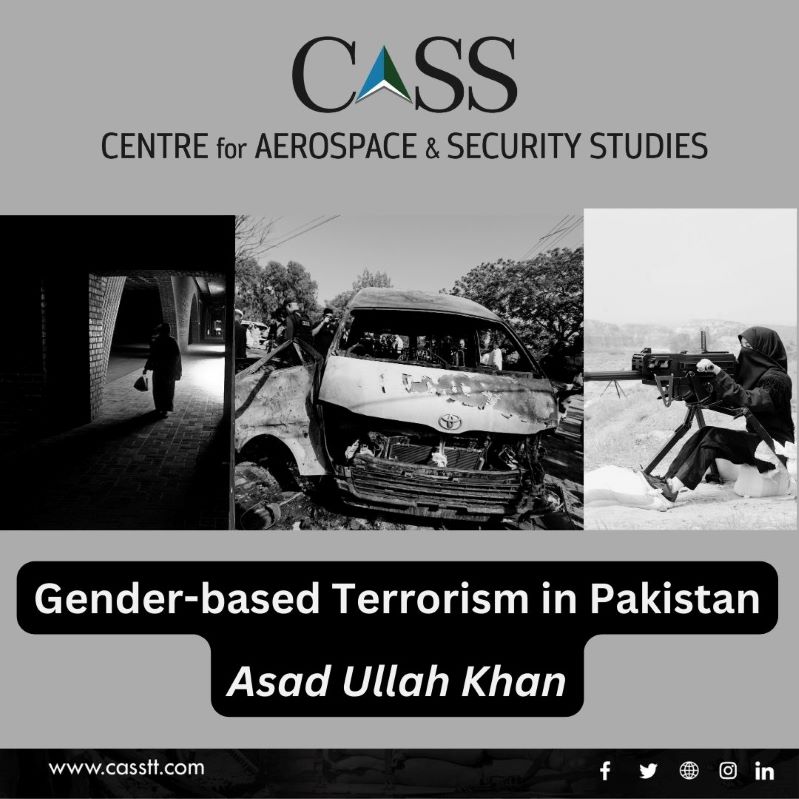The involvement of women in acts of terror is not a new phenomenon at a global level. However, it has gained significant attention in Pakistan, particularly in recent times, amidst the resurgence of extremist activities. When examining international patterns, the role of women in such acts can be analysed at two distinct levels: direct participation or as enablers and facilitators. In the context of the current dynamics of terrorism in Pakistan, women are actively involved in various aspects, such as intelligence gathering, recruiting individuals for suicide bombings, and, in certain cases, even direct engagement in acts of terror.
Despite the occurrence of the first reported female suicide attack in Bajaur, Pakistan in 2010, this phenomenon has failed to garner adequate attention from policymakers.
The recent arrest of Mahil Baloch, a suspected suicide bomber, highlights the emerging trend of terrorist organisations strategically recruiting women to exploit gender-based advantages. During investigations, it was revealed that Mahil Baloch was influenced by her husband, who was an active member of the Baloch Liberation Force (BLF). After his death, she was approached by the BLF and subsequently decided to become part of its network of operatives. It was further found that a close relative of hers, Bibi Gul, also played the role of a facilitator. She helped the BLF to transfer funds. Later, she was shifted to Iran, and a third female relative, Pari Gul, took over. Involvement of three women from a single family is cause for alarm and needs attention of policymakers and stakeholders to broaden the scope of countering terrorism strategies in Pakistan.
Similarly, in April 2022, Shari Mari, member of a separatist organisation active in Balochistan killed four people at the Karachi University in a suicide attack, including three Chinese nationals. She was a highly educated woman but was inspired by extremist narratives and ended up becoming a suicide bomber.
The circumstances of these female terrorists are not totally different, though one was highly educated (Master of Philosophy) and the other had done matriculation, both had children, relatives and were reportedly not facing any economic or social difficulties. Considering their situation, it is important to note that the detection of female terrorists is very hard and complex. Therefore, there is need to embed a strategy for gender-based terrorist detection in Pakistan.
Terrorist organisations plan their recruitment process very smartly. They often recruit members based on their objectives, ideology, and gender. Considering these factors, no single and uniform recruitment policy or method has ever been identified. In the case of Pakistan, extremist organisations are primarily focused on recruiting individuals who align with their objectives and ideologies. However, there is a growing recognition among these groups regarding the significance of gender-based recruitment. The prevailing trend indicates that extremist groups within the country are actively seeking to recruit females, aiming to inflict profound and enduring damage while making the reversal of this process challenging.
Pakistan’s disproportionately low representation of women in the workforce, with only 20 percent participation, not only falls behind international standards but also lags within South Asia. This gender imbalance leads to the underutilisation of women’s potential energies, leaving them with idle hours that may make them more susceptible to recruitment by terrorist/extremist organisations, particularly through online platforms and social media. It is crucial to recognise that these women also bear the responsibility of shaping the next generation. If influenced by extremist narratives, their presence as primary caregivers increases the likelihood of nurturing a vulnerable generation predisposed to violence and terrorism. This cycle perpetuates the potential for further recruitment and poses a long-term threat to societal stability and security.
In Pakistan’s counterterrorism policy, the focus on countering female recruitment by terrorist/extremist organisations has not been given priority. The prevailing perception links ‘terrorism’ predominantly with males, leading to an oversight of the significant role women can play in preventing and countering terrorism. By providing appropriate training and resources, women can be empowered to detect early signs of radicalisation within society. In this regard, the KPK elite women commandos inclusion and active participation in law enforcement agencies is a step in the right direction. Their presence will improve community engagement, particularly with women and children. They serve as role models, inspiring other women to participate in security-related activities, while also fostering trust and cooperation within the local communities. In a conservative society like Pakistan, the inclusion of elite women commandos will also prove beneficial in handling situations where the presence of male officers may be perceived as intrusive or culturally inappropriate. This approach has helped bridge gaps, reduce tensions, and strengthen relationships between security forces and local communities.
In general, given women’s’ access to educational institutions, religious seminaries, and social events, they can serve as crucial messengers in promoting an anti-terrorism narrative within society. To effectively address gender-based terrorism, it is essential to identify areas with a high concentration of terrorist activities. Implementing a comprehensive de-radicalisation programme targeted specifically at females in such areas can also be instrumental in reversing the damage already inflicted. By prioritising their reintegration into society and providing support services, the country can work towards countering extremist ideologies and creating a more resilient society.
Asad Ullah Khan is a Senior Research Associate at the Centre for Aerospace & Security Studies (CASS), Islamabad, Pakistan. The article was first published in Modern Diplomacy. He can be reached at: cass.thinkers@casstt.com.
Design Credit: Mysha Dua Salman
Images: Online sources




